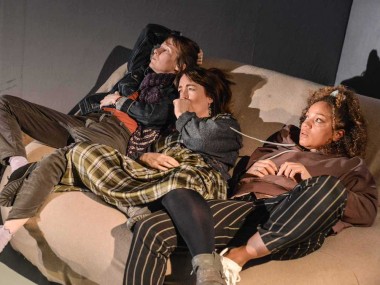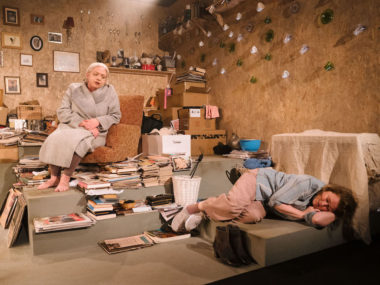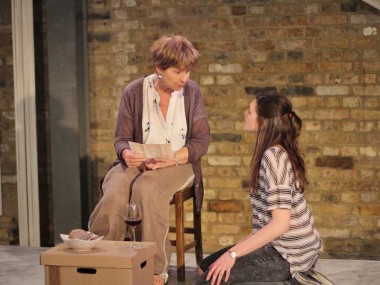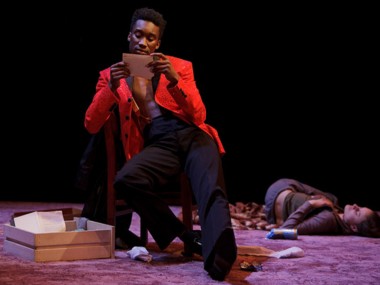Run Sister Run, Arcola Theatre
Monday 7th July 2025
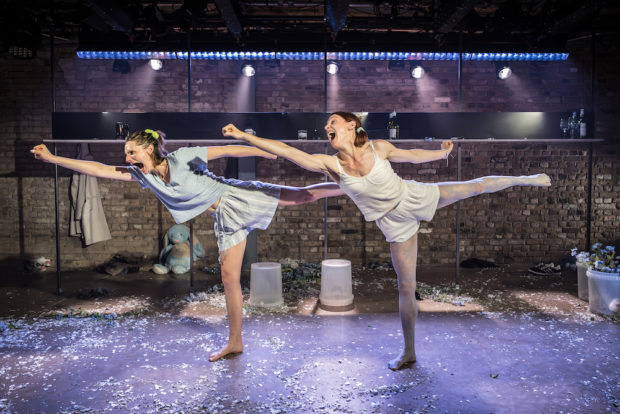
Near the start of Chloë Moss’s latest play, Run Sister Run, one character tells his wife to “Calm your nerves”. A classic moment of emotional illiteracy perhaps, but given the heightened nature of the drama’s opening scene, it does also seem like an instance of unconscious self-reflection. For this is a story that starts off fueled by high intensity and never really relaxes, one that dashes, stumbles and leaps through a variety of profound psychological states. And one that also has a troubled past. Originally opening in Sheffield in March 2020, with a different director and a different cast, its first run was interrupted by the pandemic lockdown, so this production at the Arcola Theatre is its London premiere. So what’s it all about?
Growing up, Connie and her younger sister Ursula had little parental support, and spent time in care. But while Connie has a strong determination to succeed and gets a middle-class job in PR, her sibling struggles to find a way through feelings of loss and vulnerability. Added to these differences, which are accentuated by substance abuse and self-harm, Connie is more successful in finding a life partner, the pompous middle-class Adrian. At the start of the play, which spans 40 years and is told backwards as a kind of memory drama, Connie and Adrian are reeling from a piece of news that Jack, their 19-year-old, has just told them.
The play explores how one sister’s desire to look after the other can be experienced as a form of parental control. This raises the psychological possibility that while Connie tries hard to mother Ursula, motherhood without Mum, her sister needs to become independent by pushing against such a maternal drive. This emotional tangle creates the highly charged arguments that animate the long story of the two women. At the same time, the theme of motherhood is also evident in the siblings’ different experiences of fertility. While Ursula gets pregnant easily, Connie’s attempts at having a child are much more fraught.
Moss dramatizes the decades of Connie and Ursula’s lives, sketching out their differing paths in a 100-minute show that circles around, but never quite answers, the question of why the sisters have turned out so differently. In the process, the human need to love and be loved is put through the tumble dryer, and there are recurring moments which emphasize the practice of rituals to build self-esteem, such as hugging yourself and repeating the phrase “I love you; I love you; I love you”. There are also good passages about fostering, as well as constant suggestions of the desire for figures of maternal care — resulting in instances of sibling jealousy.
The really deep feeling running throughout the play is the psychological damage that results from having an unstable childhood, with absent parents, and the profound sense of something missing. Missing stability. Missing care. Missing love. Although usually implicit, this is a strong underlying strand in Moss’s writing, which sometimes plumbs the depths, but is sometimes uneven. At the beginning, a lot of the dialogue is too obvious. The Adrian character mansplains everything, but is it really necessary that he should be so stilted, unsympathetic and unsubtle? What happened to subtext? And, if you start the plot on an emotional high, when does the drama find its nuance?
Still, the scenes between Connie and Ursula do succeed in delivering a powerful punch, and here the interactions are perceptively scripted, clearly based on detailed observation. Director Marlie Haco gets excellent performances from Jo Herbert (Connie) and Kelly Gough (Ursula), with highpoints that include an excruciating scene in which the older sister surprises the younger one during one of her binges, and a much more relaxed episode when both are fresh young teenagers, sharing the same Irish accent (which Connie abandons as an adult). Theo Fraser Steele’s Adrian and Charlie Beaven’s Jack are also good in support, but they are bit-part players in the sibling drama.
Haco’s designer is Tomás Palmer, and the set begins life as a sea of flowers and petals, reflecting Connie’s current job in a flower shop, in plastic containers that also serve as seating. As the play develops, the contents of these are liberally spilt and all add to the chaos — presumably a reflection of the turmoil inside the heads of the main characters. I’m less impressed by the unnecessary dance moves during scene changes, and the soundscape by Ákos Lustyik and Florence Hand strikes me as overwrought. The emotional temperature on stage is so high it really doesn’t need dramatic music.
This review first appeared on The Arts Desk

